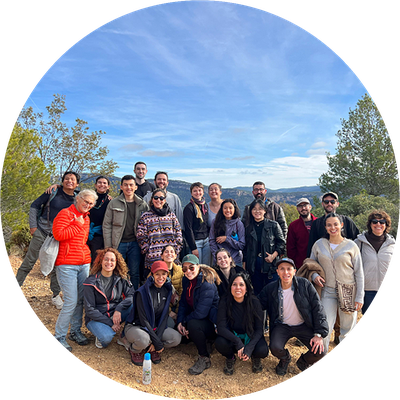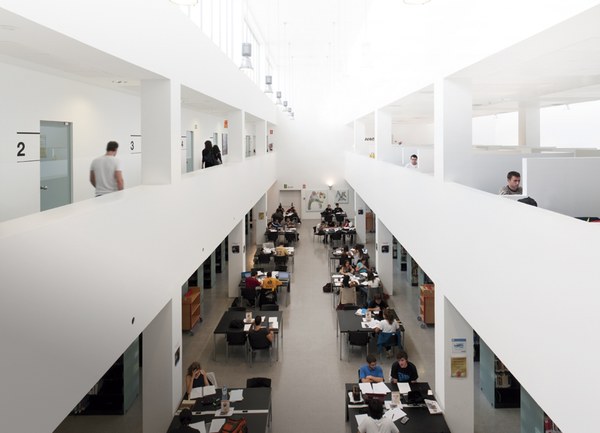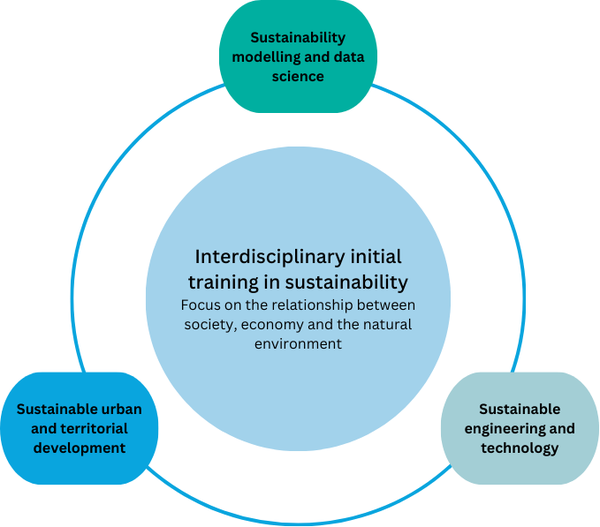The Master's has evolved towards a more comprehensive vision. Click to discover the new MUSE, the program that updates and replaces the MCTS.
We are taking a step forward in the fight for a sustainable future. The MCTS program is transformed into the new Master in Sustainability and Strategies for a Just Global Transition (MUSE). Discover the new academic proposal here.
Lead sustainable change with our Master's degree in Sustainability Science and Technology
The Master's degree in Sustainability Science and Technology is much more than an academic degree: it is a commitment to the future of humanity and the biosphere. This advanced and transdisciplinary program is aligned with the United Nations Sustainable Development Goals (SDGs), providing the necessary tools to understand and tackle major global challenges.
With an approach that integrates society, economy and the natural environment, the Master's training offers a unique education to explore innovative solutions and scientific and technological trends that drive sustainable development. It is the perfect opportunity for those who wish to lead change and transform current socio-environmental systems into resilient and sustainable models.
The Master's degree in Sustainability Science and Technology (MCTS) is aimed at graduates and professionals committed to sustainable development.
Join this transformative experience and play a key role in creating a more sustainable and just future.
Discover the Master's Philosophy
Academic and practical experiences
The Master's degree in Sustainability Science and Technology stands out for its combination of theoretical classes and practical activities. Students participate in action-research workshops, technical visits, and projects that connect learning with reality. Some examples include:
- Action-research workshops to apply sustainable methodologies to real cases.
- Field visits to learn about sustainable development initiatives and climate adaptation strategies.
- Applied projects in collaboration with key sustainability organizations, such as the Observatory of Debt in Globalization or Engineers Without Borders (ESF).
- Participation in conferences (such as the International Urban Mining Conference), national congresses (such as the National Environmental Congress), and international ones like the UNFCCC Climate Conferences.
- Master’s Thesis with opportunities to carry it out in prestigious international institutions and research centers: Barcelona Supercomputing Center - National Supercomputing Center (BSC-CNS), Andorra Research + Innovation (AR+I), Public Transport Promotion Association (PTP), the Cooperative Pole for Energy Transition (BATEC), among others.
Why study the Master's degree in Sustainability Science and Technology?
Master's program offered by an academic institution of excellence in Barcelona
The Master's program is organized in the privileged environment of the Polytechnic University of Catalonia in Barcelona by the University Research Institute for Sustainability Science and Technologies (ISST), an academic unit that promotes, coordinates, and carries out transdisciplinary training, research, and dissemination.
Official Master's in Sustainability
The Master's in Sustainability Science and Technology is an official Master's degree from the Polytechnic University of Catalonia - UPC BarcelonaTech recognized by the Ministry of Education, Culture, and Sports of Spain.
International outlook
The Master's program offers strong international exposure with mobility programs and a diverse community of international students, fostering a multicultural environment that enriches sustainability education and prepares students to lead projects in a global context.
Transdisciplinary and personalized learning
The Master's degree in Sustainability Science and Technology offers specializations in biodiversity and the natural environment, the built environment and services, or productive systems and information management, allowing students to tailor their education to their interests and professional goals. With a transdisciplinary approach, it integrates scientific, technological, and social knowledge to tackle complex problems and generate solutions with a positive impact on society.

Who is this program for?
Currently, sustainability professionals come from various fields of knowledge and university degrees, each bringing their strengths. The master's program is open to bachelor's or master's degree holders—both recent graduates and professionals seeking career transition:
-
From any field of engineering or equivalent degrees.
-
From the fields of architecture or construction, or equivalent degrees.
-
From the fields of natural sciences and mathematics, or equivalent degrees.
-
From the fields of social sciences, economics, and geography, or equivalent degrees.
Competencies and career opportunities
Design and management of sustainable projects
Lead initiatives in energy, water, waste, and urban planning with a sustainability focus.
Policy Development and Evaluation
Develop and analyse sustainable strategies for governments, businesses, and NGOs.
Research in Public and Private Institutions
Contribute to scientific advancements in climate change, biodiversity, and circular economy.
Work in Companies and Public Organizations
Manage natural resources and sustainable projects at local and international levels.
Socio-environmental consulting and engineering
Advise on environmental impact, clean technologies, and decarbonization strategies.
Academic research
You can continue in doctoral programs and contribute to university teaching and research.
Working in non-governmental organizations (NGOs)
Participate in community development, conservation and environmental education projects.
Projects of our students
Discover the multidisciplinary nature of our students' Master's Thesis (TFM).

Analysis of Alternative Mobility Proposals through Agent-Based Modeling. Implementation of Strategies in Different Urban Environments. Lara Martí, Albert (2024)
Energy Community: An Example of Energy Transition within a Large City. Fontanals Palacios, Judit (2024)
Design and Implementation of an Intelligent Decision Support System for Sustainability (ISDSS) to Achieve Zero Deforestation in the Brazilian Amazon Rainforest. Lara Aline (2023)
Discover more on UPCommons
Admission
General Information
- Duration and Start Date
- 2 academic years, 120 ECTS credits. Start: September
- Schedules and Modality
- Morning and/or afternoon (depending on options). On-site.
- Fees and Scholarships
- More information about tuition fees and payment
- Languages
- Spanish and English. Check the language of instruction for each subject in the study plan.
- Location
- UPC Campus Nord, Barcelona
Access
- General Requirements
- Academic requirements for master's access
- Specific Requirements
- View specific access requirements for the master's program
- Places
- 40
- Pre-registration
- Pre-registration period open. Deadline: until 01/07/2025.
Academic information
Academic Calendar
The academic year consists of 2 semesters.
For more detailed information, please check the following link.
Schedules
Depending on the chosen subjects, they can be in the morning and/or in the afternoon.
For more detailed information, please check the following link.







